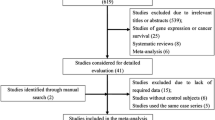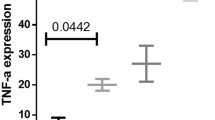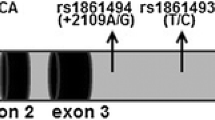Abstract
Tumor necrosis factor alpha (TNF-α) is a multifunctional cytokine which plays an important role in the human immune response against various pathogens, and there may be a relationship between TNF-α 308 G/A polymorphism and cervical cancer risk. We performed a meta-analysis to get a systemic assessment of the association between TNF-α 308 G/A polymorphism and cervical cancer risk. Electronic searches of PubMed, Embase, and Web of Science were performed for all publications on the association between TNF-α 308 G/A polymorphism and cervical cancer risk through October 26, 2012. The pooled odds ratios (ORs) with their 95 % confidence interval (95 % CIs) were calculated to assess the association. Fifteen studies with a total of 3,743 cervical cancer cases and 4,096 controls were finally included into the meta-analysis. Overall, TNF-α 308 G/A polymorphism was significantly associated with increased risk of cervical cancer under three main genetic comparison models (A vs. G, OR 1.20, 95 % CI 1.02–1.42, P = 0.03; AA vs. GG, OR 1.31, 95 % CI 1.00–1.72, P = 0.048; AA vs. GG/GA, OR 1.30, 95 % CI 1.00–1.71, P = 0.05). Subgroup analysis by ethnicity further showed that there was a significant association between TNF-α 308 G/A polymorphism and increased risk of cervical cancer in Asians (AA vs. GG, OR 1.83, 95 % CI 1.05–3.20, P = 0.034; AA vs. GG/GA, OR 1.84, 95 % CI 1.05–3.22, P = 0.032). The meta-analysis suggests that TNF-α 308 G/A polymorphism is associated with increased risk of cervical cancer, and TNF-α 308 G/A mutant allele A is a risk factor of cervical cancer.





Similar content being viewed by others
References
Jemal A, Bray F, Center MM, Ferlay J, Ward E, Forman D. Global cancer statistics. CA Cancer J Clin. 2011;61:69–90.
Forouzanfar MH, Foreman KJ, Delossantos AM, Lozano R, Lopez AD, Murray CJ, et al. Breast and cervical cancer in 187 countries between 1980 and 2010: a systematic analysis. Lancet. 2011;378:1461–84.
Schiffman M, Castle PE, Jeronimo J, Rodriguez AC, Wacholder S. Human papillomavirus and cervical cancer. Lancet. 2007;370:890–907.
Thomas M, Narayan N, Pim D, Tomaic V, Massimi P, Nagasaka K, et al. Human papillomaviruses, cervical cancer and cell polarity. Oncogene. 2008;27:7018–30.
Ibeanu OA. Molecular pathogenesis of cervical cancer. Cancer Biol Ther. 2011;11:295–306.
de Freitas AC, Gurgel AP, Chagas BS, Coimbra EC, do Amaral CM. Susceptibility to cervical cancer: an overview. Gynecol Oncol. 2012;126:304–11.
Drutskaya MS, Efimov GA, Kruglov AA, Kuprash DV, Nedospasov SA. Tumor necrosis factor, lymphotoxin and cancer. IUBMB Life. 2010;62:283–9.
Aggarwal BB, Gupta SC, Kim JH. Historical perspectives on tumor necrosis factor and its superfamily: 25 years later, a golden journey. Blood. 2012;119:651–65.
Mocellin S, Nitti D. TNF and cancer: the two sides of the coin. Front Biosci. 2008;13:2774–83.
Aukrust P, Sandberg WJ, Otterdal K, Vinge LE, Gullestad L, Yndestad A, et al. Tumor necrosis factor superfamily molecules in acute coronary syndromes. Ann Med. 2011;43:90–103.
Patel R, Cafardi JM, Patel N, Sami N, Cafardi JA. Tumor necrosis factor biologics beyond psoriasis in dermatology. Expert Opin Biol Ther. 2011;11:1341–59.
Mekinian A, Tamouza R, Pavy S, Gestermann N, Ittah M, Mariette X, et al. Functional study of TNF-alpha promoter polymorphisms: literature review and meta-analysis. Eur Cytokine Netw. 2011;22:88–102.
Qidwai T, Khan F. Tumour necrosis factor gene polymorphism and disease prevalence. Scand J Immunol. 2011;74:522–47.
Wang N, Yin D, Zhang S, Wei H, Wang S, Zhang Y, et al. TNF-alpha rs1800629 polymorphism is not associated with HPV infection or cervical cancer in the Chinese population. PLoS One. 2012;7:e45246.
Barbisan G, Perez LO, Contreras A, Golijow CD. TNF-alpha and IL-10 promoter polymorphisms, HPV infection, and cervical cancer risk. Tumour Biol. 2012;33:1549–56.
Badano I, Stietz SM, Schurr TG, Picconi AM, Fekete D, Quintero IM, et al. Analysis of TNFalpha promoter SNPs and the risk of cervical cancer in urban populations of Posadas (Misiones, Argentina). J Clin Virol. 2012;53:54–9.
Ivansson EL, Juko-Pecirep I, Gyllensten UB. Interaction of immunological genes on chromosome 2q33 and IFNG in susceptibility to cervical cancer. Gynecol Oncol. 2010;116:544–8.
Wang SS, Bratti MC, Rodriguez AC, Herrero R, Burk RD, Porras C, et al. Common variants in immune and DNA repair genes and risk for human papillomavirus persistence and progression to cervical cancer. J Infect Dis. 2009;199:20–30.
Kohaar I, Thakur N, Salhan S, Batra S, Singh V, Sharma A, et al. TNFalpha-308 G/A polymorphism as a risk factor for HPV associated cervical cancer in Indian population. Cell Oncol. 2007;29:249–56.
Govan VA, Constant D, Hoffman M, Williamson AL. The allelic distribution of -308 tumor necrosis factor-alpha gene polymorphism in south African women with cervical cancer and control women. BMC Cancer. 2006;6:24.
Duarte I, Santos A, Sousa H, Catarino R, Pinto D, Matos A, et al. G-308A TNF-alpha polymorphism is associated with an increased risk of invasive cervical cancer. Biochem Biophys Res Commun. 2005;334:588–92.
Stanczuk GA, Sibanda EN, Tswana SA, Bergstrom S. Polymorphism at the -308-promoter position of the tumor necrosis factor-alpha (TNF-alpha) gene and cervical cancer. Int J Gynecol Cancer. 2003;13:148–53.
Gostout BS, Poland GA, Calhoun ES, Sohni YR, Giuntoli 2nd RL, McGovern RM, et al. TAP1, TAP2, and HLA-DR2 alleles are predictors of cervical cancer risk. Gynecol Oncol. 2003;88:326–32.
Cochran WG. The combination of estimates from different experiments. Biometrics. 1954;10:101–29.
Mantel N, Haenszel W. Statistical aspects of the analysis of data from retrospective studies of disease. J Natl Cancer Inst. 1959;22:719–48.
DerSimonian R, Laird N. Meta-analysis in clinical trials. Control Clin Trials. 1986;7:177–88.
Jang WH, Yang YI, Yea SS, Lee YJ, Chun JH, Kim HI, et al. The -238 tumor necrosis factor-alpha promoter polymorphism is associated with decreased susceptibility to cancers. Cancer Lett. 2001;166:41–6.
Calhoun ES, McGovern RM, Janney CA, Cerhan JR, Iturria SJ, Smith DI, et al. Host genetic polymorphism analysis in cervical cancer. Clin Chem. 2002;48:1218–24.
Deshpande A, Nolan JP, White PS, Valdez YE, Hunt WC, Peyton CL, et al. TNF-alpha promoter polymorphisms and susceptibility to human papillomavirus 16-associated cervical cancer. J Infect Dis. 2005;191:969–76.
Singh H, Jain M, Sachan R, Mittal B. Association of TNFα (-308 G > A) and IL-10 (-819C > T) promoter polymorphisms with risk of cervical cancer. Int J Gynecol Cancer. 2009;19:1190–4.
Wang Q, Zhang C, Walayat S, Chen HW, Wang Y. Association between cytokine gene polymorphisms and cervical cancer in a Chinese population. Eur J Obstet Gynecol Reprod Biol. 2011;158:330–3.
Gorouhi F, Islami F, Bahrami H, Kamangar F. Tumour-necrosis factor-α polymorphisms and gastric cancer risk: a meta-analysis. Br J Cancer. 2008;98:1443–51.
Fan W, Maoqing W, Wangyang C, Fulan H, Dandan L, Jiaojiao R, et al. Relationship between the polymorphism of tumor necrosis factor-alpha-308 G > A and susceptibility to inflammatory bowel diseases and colorectal cancer: a meta-analysis. Eur J Hum Genet. 2011;19:432–7.
Yang Y, Luo C, Feng R, Bi S. The TNF-alpha, IL-1B and IL-10 polymorphisms and risk for hepatocellular carcinoma: a meta-analysis. J Cancer Res Clin Oncol. 2011;137:947–52.
Wang J, Cao C, Luo H, Xiong S, Xu Y, Xiong W. Tumour necrosis factor alpha -308 G/A polymorphism and risk of the four most frequent cancers: a meta-analysis. Int J Immunogenet. 2011;38:311–20.
Peng WJ, He Q, Yang JX, Wang BX, Lu MM, Wang S, et al. Meta-analysis of association between cytokine gene polymorphisms and lung cancer risk. Mol Biol Rep. 2012;39:5187–94.
Conflicts of interest
None
Author information
Authors and Affiliations
Corresponding author
Rights and permissions
About this article
Cite this article
Zhang, HL., Zhang, YJ. A systemic assessment of the association between tumor necrosis factor alpha 308 G/A polymorphism and risk of cervical cancer. Tumor Biol. 34, 1659–1665 (2013). https://doi.org/10.1007/s13277-013-0699-x
Received:
Accepted:
Published:
Issue Date:
DOI: https://doi.org/10.1007/s13277-013-0699-x




